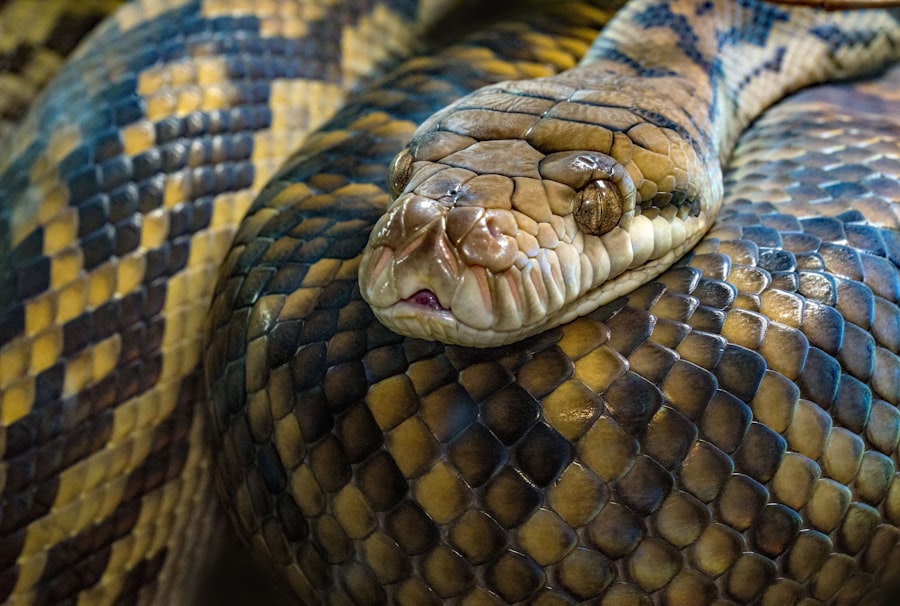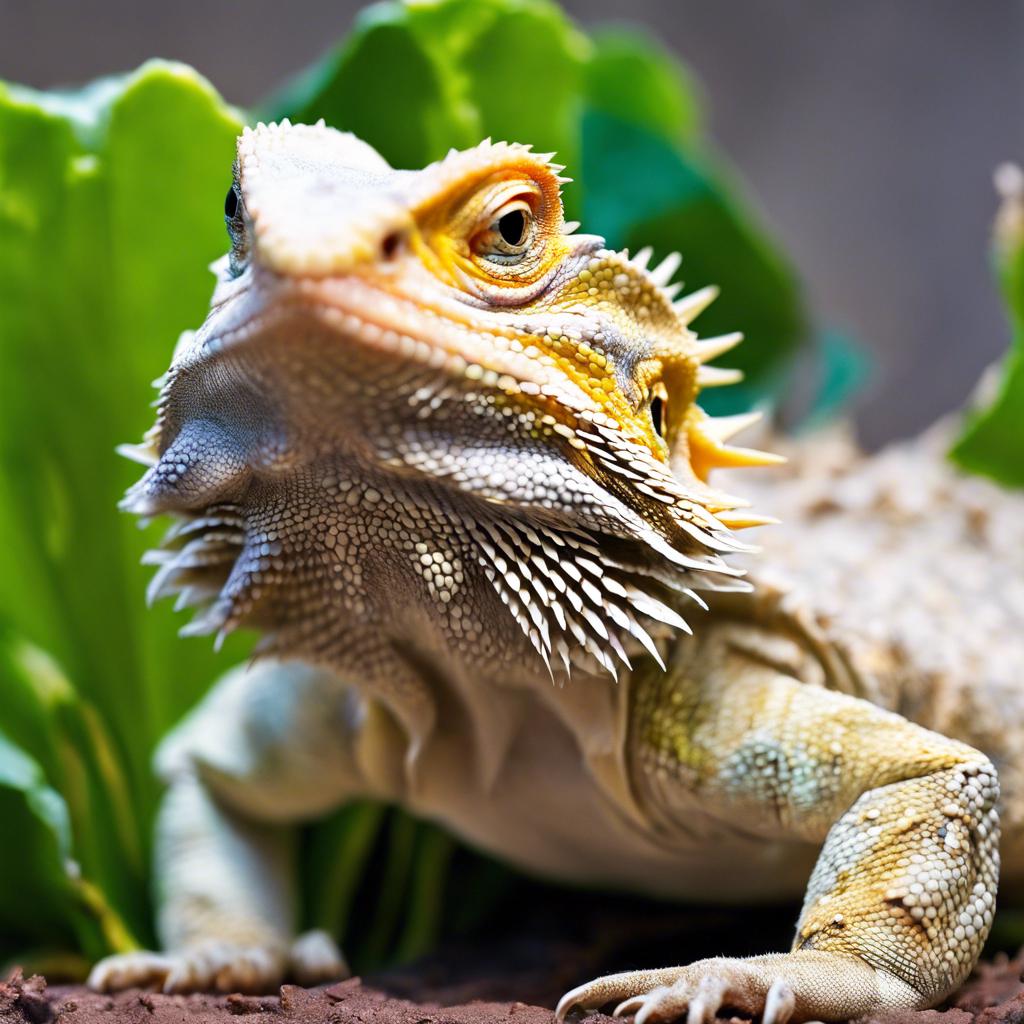Kohlrabi is a unique vegetable that belongs to the cabbage family. It has a bulbous shape with a thick stem and leaves that resemble collard greens. This vegetable is not only delicious for humans, but it can also be a healthy addition to a bearded dragon's diet. Bearded dragons are omnivorous reptiles that require a balanced diet to thrive. While they primarily eat insects, it is important to incorporate vegetables into their diet to ensure they receive all the necessary nutrients.
Key Takeaways
- Kohlrabi is a nutritious vegetable that can be fed to bearded dragons.
- Kohlrabi is high in fiber, vitamin C, and potassium, making it a great addition to a bearded dragon's diet.
- Kohlrabi should be peeled and chopped into small pieces before being fed to bearded dragons.
- Bearded dragons should only be fed a small amount of kohlrabi as part of a balanced diet that includes other vegetables and protein sources.
- Other vegetables that can be fed to bearded dragons include collard greens, kale, and squash.
Nutritional Value of Kohlrabi for Bearded Dragons
Kohlrabi is packed with essential nutrients that can benefit the health of bearded dragons. It is rich in vitamins A, C, and K, which are important for maintaining healthy skin, promoting proper growth, and supporting the immune system. Additionally, kohlrabi contains minerals such as calcium, potassium, and magnesium, which are crucial for bone health and muscle function.
The high fiber content in kohlrabi can aid in digestion and prevent constipation in bearded dragons. It also contains antioxidants that help protect against oxidative stress and inflammation. These nutrients contribute to the overall well-being of bearded dragons and can help prevent deficiencies and health issues.
Preparing Kohlrabi for Bearded Dragons
Before feeding kohlrabi to your bearded dragon, it is important to properly prepare it. Start by washing the kohlrabi thoroughly to remove any dirt or pesticides. Then, peel off the tough outer skin using a vegetable peeler or knife. The inner flesh is what your bearded dragon will eat.
Next, cut the kohlrabi into small, bite-sized pieces that are easy for your bearded dragon to consume. It is important to cut the pieces into appropriate sizes to prevent choking hazards. Remember that bearded dragons have small mouths, so smaller pieces are ideal.
How Much Kohlrabi Should Bearded Dragons Eat?
The amount of kohlrabi that should be fed to a bearded dragon depends on its size and age. As a general guideline, adult bearded dragons can be fed a few small pieces of kohlrabi once or twice a week. Juvenile bearded dragons, on the other hand, can be given a small piece of kohlrabi every other day.
It is important not to overfeed kohlrabi to bearded dragons, as this can lead to digestive issues. Bearded dragons have specific dietary requirements, and their diet should consist of a variety of foods to ensure they receive all the necessary nutrients. Kohlrabi should be offered as part of a balanced diet, alongside other vegetables and insects.
Other Vegetables That Can Be Fed to Bearded Dragons
In addition to kohlrabi, there are several other vegetables that can be fed to bearded dragons. These include leafy greens such as kale, collard greens, and mustard greens. These greens are rich in vitamins and minerals and can provide a variety of nutrients for your bearded dragon.
Other vegetables that can be included in a bearded dragon's diet include bell peppers, squash, carrots, and green beans. These vegetables are high in fiber and provide additional vitamins and minerals. It is important to offer a variety of vegetables to ensure your bearded dragon receives a well-rounded diet.
Bearded Dragon Care: Providing a Balanced Diet

Providing a balanced diet is crucial for the overall health and well-being of your bearded dragon. In addition to vegetables, their diet should also include protein from insects such as crickets, mealworms, and dubia roaches. These insects provide essential nutrients such as protein and calcium.
It is important to vary the types of insects offered to your bearded dragon to ensure they receive a diverse range of nutrients. Additionally, it is recommended to dust the insects with a calcium supplement before feeding them to your bearded dragon. This helps prevent calcium deficiencies, which can lead to metabolic bone disease.
Bearded Dragon Health Issues Related to Diet
An improper diet can lead to various health issues in bearded dragons. One common issue is metabolic bone disease, which occurs when there is a calcium deficiency in the diet. This can result in weak bones, deformities, and even fractures. Another health issue that can arise from an unbalanced diet is obesity. Bearded dragons that are fed too many high-fat foods can become overweight, leading to a range of health problems.
Signs of Nutritional Deficiencies in Bearded Dragons
It is important to be aware of the signs of nutritional deficiencies in bearded dragons so that they can be addressed promptly. Some common signs include weight loss, lethargy, poor appetite, soft or deformed bones, and changes in skin color or texture. If you notice any of these signs in your bearded dragon, it is important to consult a veterinarian who specializes in reptiles.
Common Health Problems Caused by Improper Diet
An improper diet can lead to a variety of health problems in bearded dragons. Metabolic bone disease is one of the most common issues and can result in weak bones, fractures, and deformities. Obesity is another common problem that can lead to fatty liver disease and other complications.
Inadequate nutrition can also weaken the immune system, making bearded dragons more susceptible to infections and diseases. Additionally, a lack of essential nutrients can affect their overall growth and development. Providing a balanced diet is crucial for preventing these health problems and ensuring the long-term health of your bearded dragon.
Kohlrabi as a Healthy Addition to a Bearded Dragon's Diet
In conclusion, kohlrabi can be a healthy addition to a bearded dragon's diet. It is packed with essential nutrients that contribute to their overall health and well-being. However, it is important to remember that kohlrabi should be offered as part of a balanced diet, alongside other vegetables and insects.
Providing a balanced diet is crucial for the proper growth and development of bearded dragons. It helps prevent nutritional deficiencies and health issues that can arise from an improper diet. By incorporating kohlrabi and other vegetables into your bearded dragon's diet, you can ensure they receive all the necessary nutrients for a long and healthy life.
If you're curious about what other foods are safe for your bearded dragon, you might want to check out this informative article on Reptile Wizard's website. They have a comprehensive guide on reptile keeping and provide valuable insights into the dietary needs of bearded dragons. In fact, they even have an article specifically discussing whether pothos plants are safe for bearded dragons. To learn more about the topic, head over to Reptile Wizard and explore their wealth of reptile-related knowledge.
FAQs
What is kohlrabi?
Kohlrabi is a vegetable that belongs to the cabbage family. It has a bulbous shape and a green or purple exterior.
Is kohlrabi safe for bearded dragons to eat?
Yes, kohlrabi is safe for bearded dragons to eat in moderation.
What are the nutritional benefits of kohlrabi for bearded dragons?
Kohlrabi is a good source of fiber, vitamin C, and potassium, which can help support a bearded dragon's digestive and immune systems.
How should kohlrabi be prepared for bearded dragons?
Kohlrabi should be washed thoroughly and cut into small, bite-sized pieces before being offered to a bearded dragon. It can be served raw or cooked.
Can bearded dragons eat kohlrabi leaves?
Yes, bearded dragons can eat kohlrabi leaves in moderation. However, the leaves should be washed thoroughly and any tough stems should be removed before feeding.
Are there any risks associated with feeding kohlrabi to bearded dragons?
While kohlrabi is generally safe for bearded dragons to eat, it should be fed in moderation as part of a balanced diet. Overfeeding kohlrabi or any other vegetable can lead to digestive issues or nutrient imbalances.

